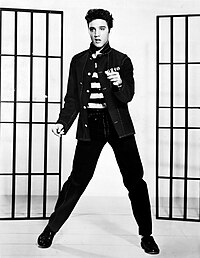MGM Parade
MGM Parade is the title of a documentary television series produced by Metro-Goldwyn-Mayer and broadcast by the ABC network during the 1955-56 season on Wednesdays at 8:30pm (E.S.T.), under the alternate sponsorship of American Tobacco (Pall Mall), and General Foods (Instant Maxwell House).
Hosted by George Murphy (September 14th, 1955 – March 7th, 1956), Walter Pidgeon (March 14th – May 2nd, 1956) and other MGM stars, the series went into the MGM vaults to offer segments extracted from such past productions as Good News (1947) and The Pirate (1948); in December, a condensed edition of the 1938 version of A Christmas Carol was presented for the first time on television. Exploring the inner workings of the MGM studios, it featured interviews with prominent MGM actresses and actors to promote current and upcoming releases. The program also presented edited “selected short subjects” from the studio’s library (Carey Wilson’s Miniatures, John Nesbitt’s Passing Parade, Pete Smith’s Specialties, Robert Benchley, Tex Avery’s cartoons, et al.). After Walter Pidgeon became the host, the format was slightly altered to include edited multi-part versions of “classic” MGM feature films, including Captains Courageous and The Pirate, as well as a biography of Greta Garbo.

 In the mid-1950s Elvis Presley became the leading figure of the newly popular sound of Rock-n-Roll.
In the mid-1950s Elvis Presley became the leading figure of the newly popular sound of Rock-n-Roll.




